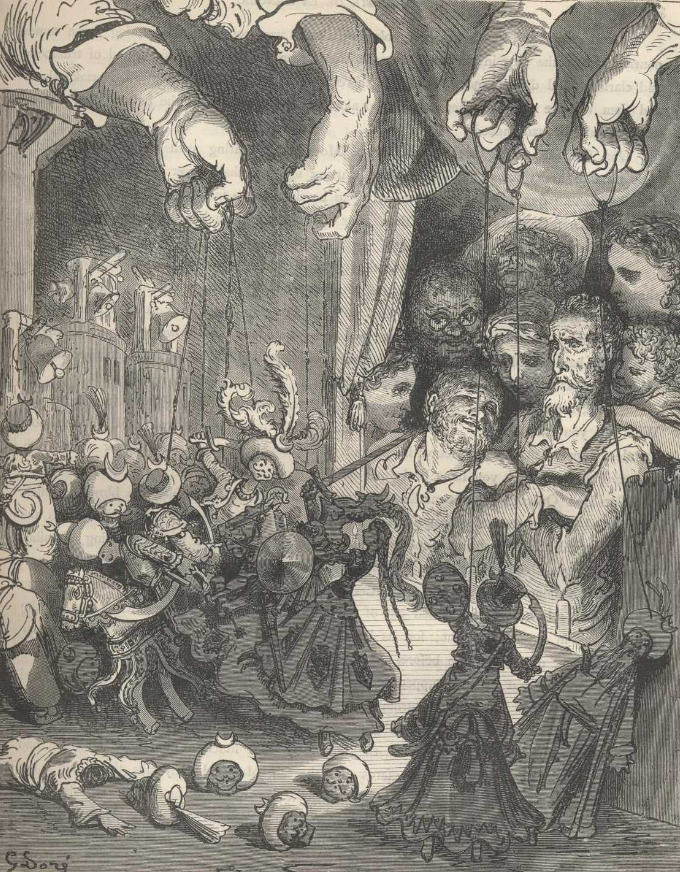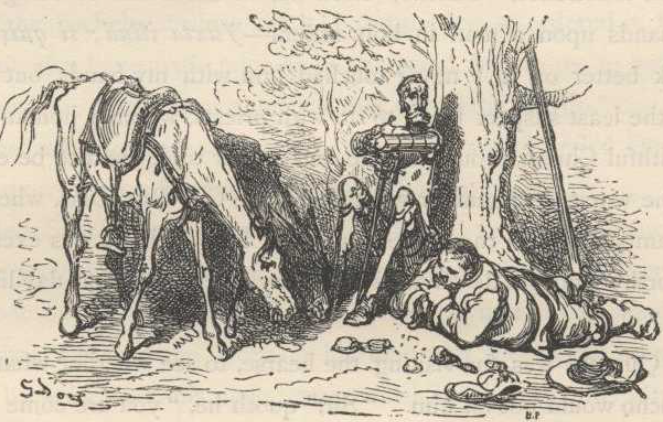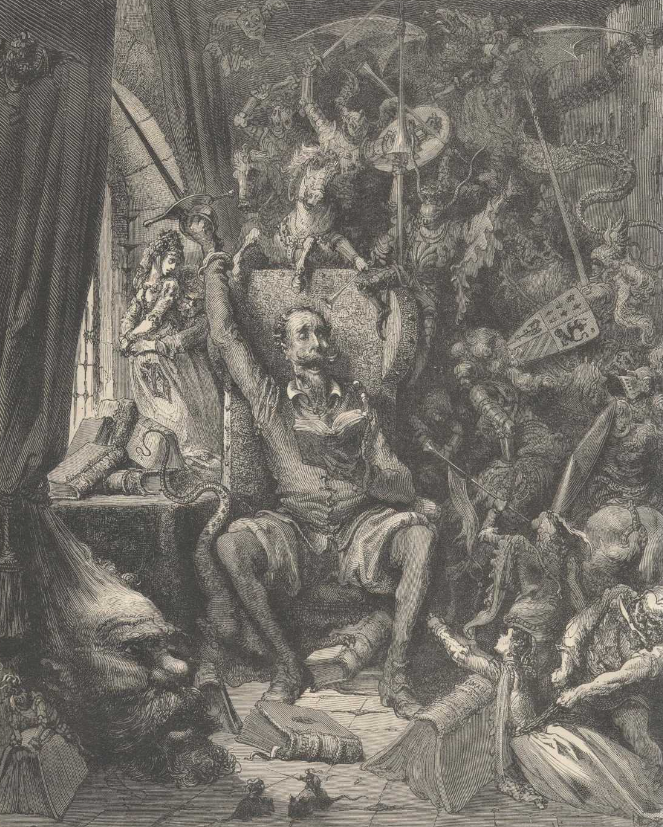Amidst a charade insula governorship, after a charade military invasion, Sancho Panza renounces worldly wealth and ambitions.
He (Sancho) got himself dressed at last, and then, slowly, for he was sorely bruised and could not go fast, he proceeded to the stable, followed by all who were present, and going up to Dapple embraced him and gave him a loving kiss on the forehead, and said to him, not without tears in his eyes, “Come along, comrade and friend and partner of my toils and sorrows; when I was with you and had no cares to trouble me except mending your harness and feeding your little carcass, happy were my hours, my days, and my years; but since I left you, and mounted the towers of ambition and pride, a thousand miseries, a thousand troubles, and four thousand anxieties have entered into my soul;” and all the while he was speaking in this strain he was fixing the pack-saddle on the ass, without a word from anyone. Then having Dapple saddled, he, with great pain and difficulty, got up on him, and addressing himself to the majordomo, the secretary, the head-carver, and Pedro Recio the doctor and several others who stood by, he said, “Make way, gentlemen, and let me go back to my old freedom; let me go look for my past life, and raise myself up from this present death. I was not born to be a governor or protect islands or cities from the enemies that choose to attack them. Ploughing and digging, vinedressing and pruning, are more in my way than defending provinces or kingdoms. Saint Peter is very well at Rome; I mean each of us is best following the trade he was born to. A reaping-hook fits my hand better than a governor’s sceptre; I’d rather have my fill of gazpacho than be subject to the misery of a meddling doctor who kills me with hunger, and I’d rather lie in summer under the shade of an oak, and in winter wrap myself in a double sheepskin jacket in freedom, than go to bed between holland sheets and dress in sables under the restraint of a government. God be with your worships, and tell my lord the duke that ‘naked I was born, naked I find myself, I neither lose nor gain;’ I mean that without a farthing I came into this government, and without a farthing I go out of it, very different from the way governors commonly leave other islands. Stand aside and let me go; I have to plaster myself, for I believe every one of my ribs is crushed, thanks to the enemies that have been trampling over me to-night.”
“That is unnecessary, señor governor,” said Doctor Recio, “for I will give your worship a draught against falls and bruises that will soon make you as sound and strong as ever; and as for your diet I promise your worship to behave better, and let you eat plentifully of whatever you like.”
“You spoke late,” said Sancho. “I’d as soon turn Turk as stay any longer. Those jokes won’t pass a second time. By God I’d as soon remain in this government, or take another, even if it was offered me between two plates, as fly to heaven without wings. I am of the breed of the Panzas, and they are every one of them obstinate, and if they once say ‘odds,’ odds it must be, no matter if it is evens, in spite of all the world. Here in this stable I leave the ant’s wings that lifted me up into the air for the swifts and other birds to eat me, and let’s take to level ground and our feet once more; and if they’re not shod in pinked shoes of cordovan, they won’t want for rough sandals of hemp; ‘every ewe to her like,’ ‘and let no one stretch his leg beyond the length of the sheet;’ and now let me pass, for it’s growing late with me.”
To this the majordomo said, “Señor governor, we would let your worship go with all our hearts, though it sorely grieves us to lose you, for your wit and Christian conduct naturally make us regret you; but it is well known that every governor, before he leaves the place where he has been governing, is bound first of all to render an account. Let your worship do so for the ten days you have held the government, and then you may go and the peace of God go with you.”
“No one can demand it of me,” said Sancho, “but he whom my lord the duke shall appoint; I am going to meet him, and to him I will render an exact one; besides, when I go forth naked as I do, there is no other proof needed to show that I have governed like an angel.”
“By God the great Sancho is right,” said Doctor Recio, “and we should let him go, for the duke will be beyond measure glad to see him.”






Recent Comments